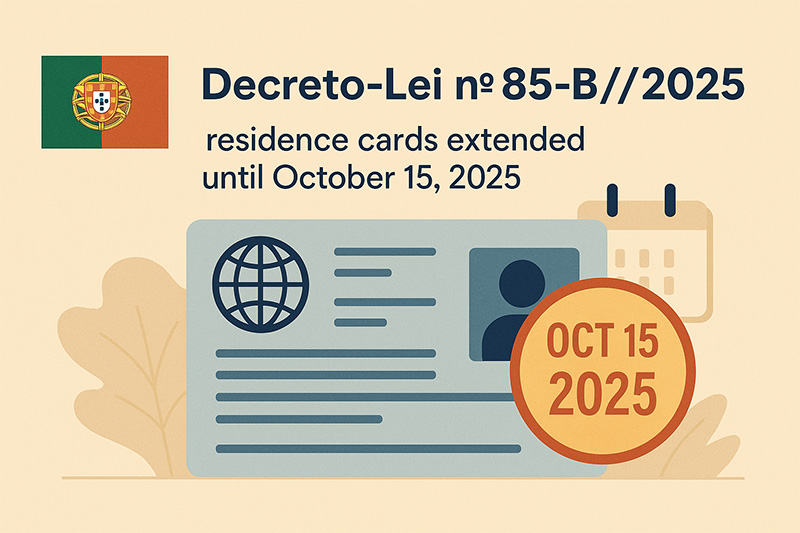
Overview of Decree Law 85-B/2025
On June 30, 2025, the Presidency of the Council of Ministers enacted Decree Law No. 85-B/2025. This law automatically extends the validity of residence permits for foreign nationals in Portugal.
Context and Rationale
First, this measure continues the emergency policy introduced by Decree Law 10-A/2020 on March 13, 2020. That law was passed in response to the COVID-19 pandemic, which disrupted the functioning of migration services. It extended expired residence permits that had lapsed after February 22, 2020.
Second, even after the end of the public health emergency, major administrative delays persisted. These delays were due to the dissolution of SEF (Serviço de Estrangeiros e Fronteiras), the transfer of immigration responsibilities to AIMA, IP (Agency for Integration, Migrations and Asylum), and a backlog of over 500,000 cases. These applications have been processed through a dedicated mission structure between July 2024 and June 2025.
Third, the Portuguese government recognized the need to provide legal certainty and stability for foreign residents. To do so, Decree Law 85-B/2025 grants an automatic extension of expired residence permits until they can be properly renewed.
Key Provisions
Article 1 sets the objective of extending the validity of residence authorisations for foreign nationals in Portugal.
Article 2 outlines the extension details. Any residence permit that expired between February 22, 2020 and June 30, 2025 is automatically extended until October 15, 2025. After that date, from October 16, 2025 onward, expired documents will still be accepted if the holder can present a receipt of renewal payment issued by AIMA, IP. That receipt will be valid for 180 days from the date of issue. AIMA is responsible for publishing detailed guidelines on how renewals will be processed and may continue using the mission taskforce to help clear the backlog.
Article 3 confirms that the decree takes effect the day after its publication, meaning it becomes law on July 1, 2025.
Impacts and Implications
Foreign residents whose residence documents expired by June 30, 2025 will remain legally recognized in Portugal through October 15, 2025. They can continue accessing work, education, healthcare, and other services without interruption. There is no mention of extended visa expirations as of yet.
The extension supports administrative efficiency by aligning with AIMA’s existing digital systems and dedicated mission teams. The law provides legal clarity by dividing the policy into two phases. First is a grace period until October 15, 2025. After that, expired documents must be accompanied by a valid renewal receipt to remain legally accepted.
Who It Affects
This law applies to foreign nationals from both EU and non-EU countries, including citizens of CPLP nations. It affects travelers, students, workers, family members, and anyone whose documents expired during the covered period. Employers, schools, and public service providers can rely on the extended validity for legal verification.
Why It Matters
Decree Law 85-B/2025 demonstrates the Portuguese government's commitment to balancing administrative limitations with the rights of foreign nationals. It maintains legal stability, protects access to essential services, and provides a clear path forward for completing pending residence renewals. It also reinforces the role of digital systems and targeted taskforces in modernizing the immigration process.
Timeline Summary
From February 22, 2020 to June 30, 2025: The period in which documents may have expired
Until October 15, 2025: Automatic extension of residence validity
From October 16, 2025 onward: Expired documents accepted only if presented with a valid renewal payment receipt issued by AIMA, valid for 180 days
Conclusion
Decree Law 85-B/2025 provides a necessary buffer for foreign residents living in Portugal while the country's migration authorities work to modernize and stabilize operations. By combining a grace period with structured renewal rules, the law ensures that migrants can remain in legal status and access vital services. It is a practical, human-centered solution during a period of institutional transition.
